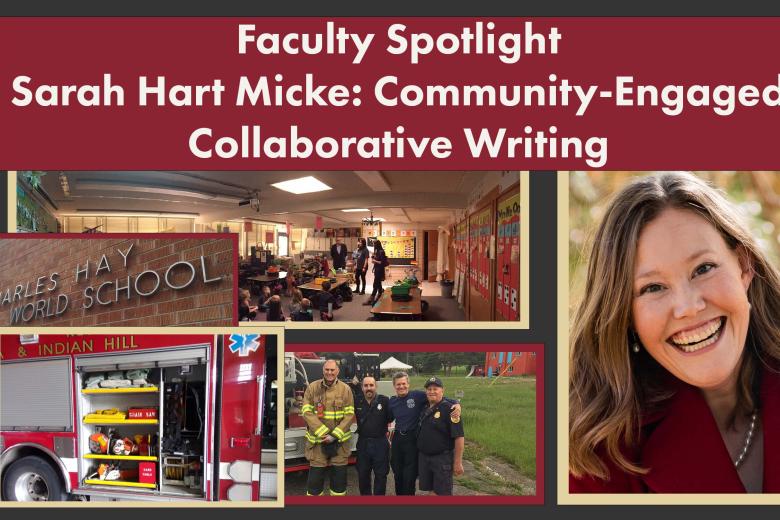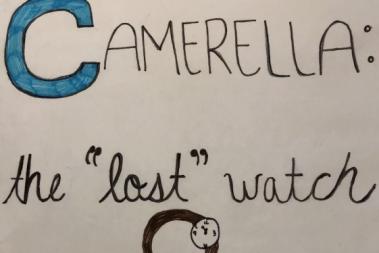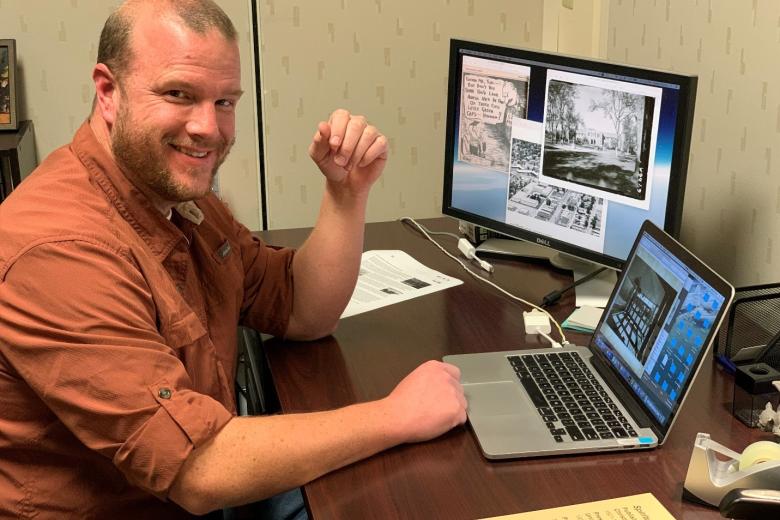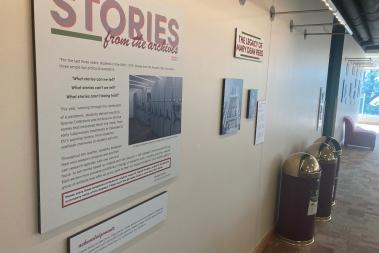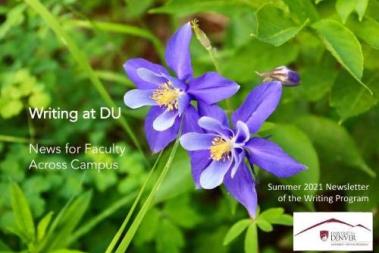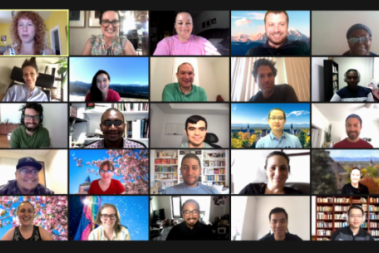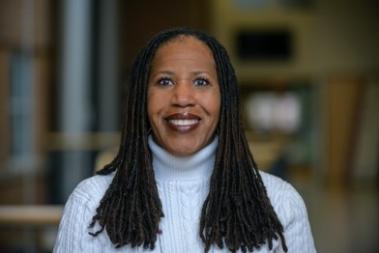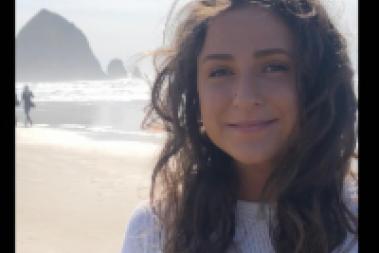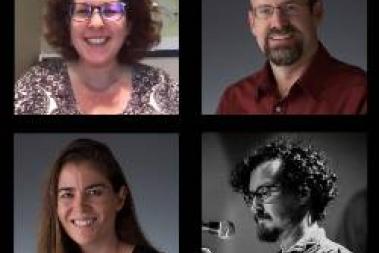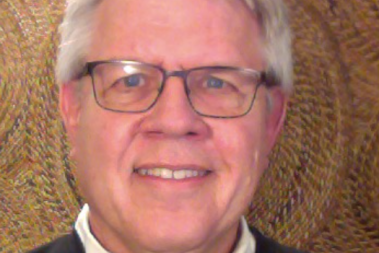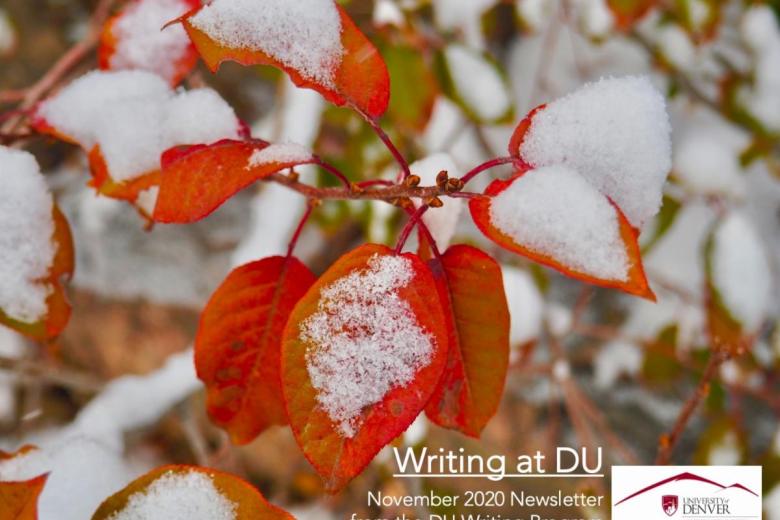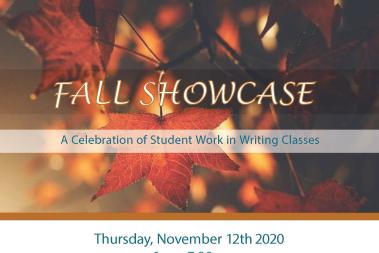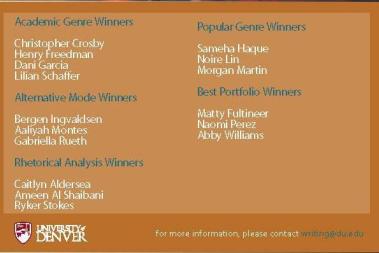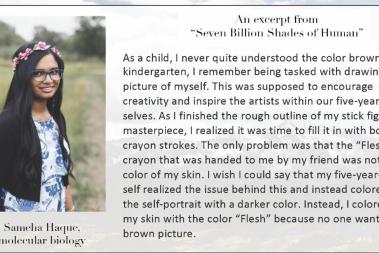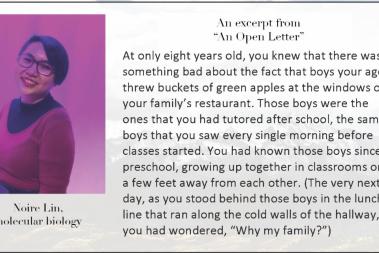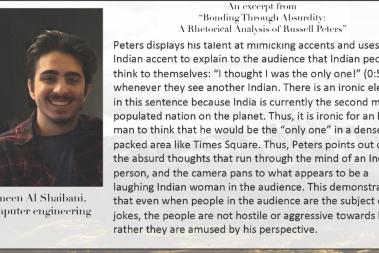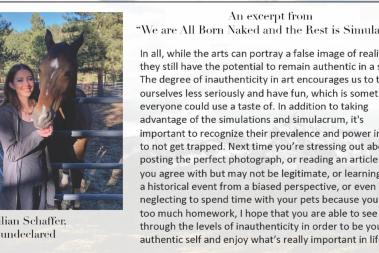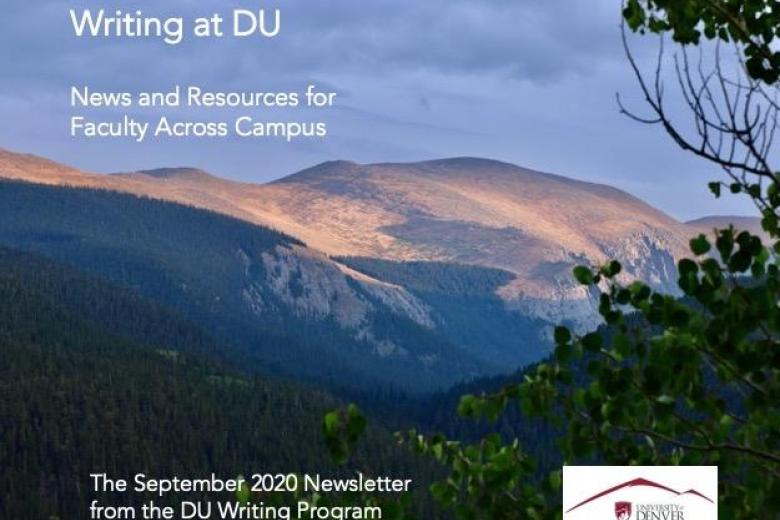UWP Blog Archive
Faculty Spotlight: Sarah Hart Mike
Fall 2021, Written by Kamila Kinyon.
This article is one in a series of Faculty Spotlights created by the Student Outreach and Celebration Committee
When most students think of a required writing class, they’ll likely think of formal thesis statements, a required number of sources, perfect MLA, carefully crafted sentences, and sculpted paragraphs, all to fit in with a generalized notion of what academic writing means. However, DU’s writing sequence asks students to expand their concept of writing to involve a range of genres for specific audiences, public as well as scholarly. Within this larger framework, service learning courses make the notion of audience come alive by tying writing to collaboration with a particular community. This fostering of collaborative relationships in writing is central to Professor Sarah Hart Micke’s vision.
"Asked about her approach, Hart Micke found that this “gives students a strong sense of real readers” and builds students’ awareness of the need for writing, of an actual audience, and of what makes writing meaningful."
Working closely with CCELL and nearby Charles Hay Elementary School, Hart Micke introduces students to the concepts of community-engaged collaborative writing in her WRIT 1122 service-learning course, a course that asks college writers to reimagine and re-write classic fairy tales with and for second graders. During the writing process, DU students closely analyze a curricular text for its rhetorical effects, give feedback to the second-graders on their writing, and then write a fairy tale of their own to share. Asked about her approach, Hart Micke found that this “gives students a strong sense of real readers” and builds students’ awareness of the need for writing, of an actual audience, and of what makes writing meaningful.
While teaching this course, Hart Micke formed a close collaborative relationship with her student Carly Hudson, who created the fairy tale “Camarella: The ‘Lost’ Watch,” pictured above, to share with her second-graders. During winter quarter 2020, Hudson served as Public Good Fellow for Hart Micke’s WRIT 1122 classes. Later the same year, and despite Covid-19 restrictions, Hudson helped brainstorm ways that DU and elementary students could continue working together through online writing activities. Hudson worked with Hart Micke to redesign WRIT 1122 for an online format.
Hudson also helped Hart Micke and Angela Sowa develop the WRIT 2800: Community Writing course, based on Hart Micke and Sowa’s Winter 2018 course that partnered DU writers with Indian Hills Fire Rescue to learn about grant writing. Sowa will be teaching a new iteration of WRIT 2800 in spring of 2022.
Hart Micke’s spring 2022 online synchronous sections of “Rhetoric, Journalism, and Social Justice: A Glimpse into the Past” explore how journalists write and why it matters. This innovative course shows how community can be fostered even under the altered conditions brought about by the Covid-19 pandemic.
Although COVID has paused Hart Micke’s service learning courses this year, her new WRIT 1122 course centers on cultivating community through journalism. Students study the life and work of a mentor writer, a 20th century journalist of their choice, then use that mentor to cultivate, shape, and inspire their own writing. Hart Micke’s spring 2022 online synchronous sections of “Rhetoric, Journalism, and Social Justice: A Glimpse into the Past” explore how journalists write and why it matters. This innovative course shows how community can be fostered even under the altered conditions brought about by the Covid-19 pandemic.
Hart Micke continues to inspire us with her collaborative work with students and her versatile approaches to rhetoric and community-engaged writing.
Faculty Spotlight: Rob Gilmor
This article is one in a series of Faculty Spotlights created by the Student Outreach and Celebration Committee.
In Professor Robert Gilmor’s research courses, students don’t simply acquire knowledge – they build knowledge, together, diving deep into DU’s extensive Special Collections and Archives to uncover stories from our collective past. In his research and writing courses, Gilmor asks his students a few seemingly simple opening questions: What stories can we tell? What stories can’t we tell? What stories aren’t being told?
From there, students dedicate weeks of work, searching through primary artifacts, historical records, city ledgers, faded DU yearbooks, and other displaced materials. In the process, they work closely with librarians Jeanne Abrams and Katherine Crowe, both curators of DU’s special collections, to uncover a past that was.
And the stories that Gilmor’s students have uncovered include everything from the history of the Alpine Club on campus to DU’s self-proclaimed “Woodstock of the West,” which involved a strike and picket lines, a boycott on classes, plus a squad of manufactured structures that served as a commune (and sit-in) to protest the Vietnam War.
Gilmor asks his students a few seemingly simple opening questions: What stories can we tell? What stories can’t we tell? What stories aren’t being told?
Along the way, Gilmor’s students gain first-hand experience with archival research, using interpretive methods to analyze and understand primary artifacts within their original contexts, while also wrestling with ethical questions of who can tell whose stories fairly and most appropriately. Their efforts pay off at the end of the quarter with physical and digital exhibits of their work: imagine mini museum galleries of images and text, each focused on an individual project.
[insert picture: facultyspotlightrobgilmorfall12021.jpg; alt text=A physical exhibit hanging in Anderson Academic Commons in Fall of 2021]
Emily Gillette, one of Gilmor’s recent students, took on the 1918 Pandemic as her personal project, asking what student life must have looked like for students on the DU campus, how students’ daily lives were changed, how everything from athletics to the Students’ Army Training Corps (SATC) had to have been transformed by a viral outbreak that ended up claiming 55 million lives.
Among Gillette’s most interesting findings was that, in September 1918, the influenza pandemic eventually reached Colorado, striking particularly close to home: the first documented case in Colorado was of Blanche Kennedy, a 20-year-old University of Denver student at the time.
“Some of the most useful things I learned while taking [Gilmor’s] class,” Gillette writes, “was how to do research… by narrowing down search parameters to get the most relevant information” efficiently. Gillette credits Professor Gilmor’s instruction for helping her locate “what may be the only existing photo of Blanche Kennedy.”
A DU student: the first documented case. As Gillette writes, young Blanche Kennedy returned to campus after a family trip to Chicago, a city that, at the time, “had been a hotspot for influenza,” and, Gillette continues, Kennedy perished on September 27th.
“Some of the most useful things I learned while taking [Gilmor’s] class,” Gillette writes, “was how to do research… by narrowing down search parameters to get the most relevant information” efficiently. Gillette credits Professor Gilmor’s instruction for helping her locate “what may be the only existing photo of Blanche Kennedy.”
Such discoveries make research and writing matter to students, as they learn to position themselves in the larger cultural legacy of DU and begin to understand themselves more fully in our collective history. “It’s about discovering and making connections,” says Gilmor, “between students and the past, between the past and the present. The exhibits are a great payoff, too, as they offer chances to reach a real audience: the DU community we’re all a part of.”
Summer 2021 Newsletter
- The University Writing Program, Doug Hesse, Executive Director | dhesse@du.edu | writing@du.edu
- The Writing Center, Juli Parrish, Director | Juli.Parrish@du.edu
- In this issue:
- Writing Retreat Engages 47 Faculty from across DU
- Re-Visioning Teaching: 20 Essays by Writing Professors
- Zooming in: Lessons from the Pandemic Writing Center
- Student Katey Foley Interviews Professor Scott Phillips
- News & Notes
Retreat Engages 47 Faculty Writers from Across DU (July 13, 2021)
In June, the Writing Program hosted intensive writing retreats for 47 DU faculty, from all 6 faculty series, from 10 DU colleges and schools. Collectively, these professors spent 123 hours in cross-disciplinary conversations about writing. Individually, each produced 12 hours of writing. Even as they re-energized key projects, professors valued connecting to colleagues across campus. In the case of many who began at DU during the pandemic, this was the first time they had extended interactions with colleagues from other departments.
We knew that that many faculty’s writing habits had been disrupted over the past academic year, as we and they found ways to teach our classes, carry out service and community responsibilities, and support our students in the ever-changing pandemic academic landscape. We aimed to help faculty to end the year by jump-starting or refreshing writing projects that may have idled for the past few months or quarters. We had three goals: 1) to create space for faculty to dedicate their time and attention to a writing project; 2) to encourage faculty to establish or reconnect with a consistent writing practice; and 3) to build a community of support and accountability with a focus on the writing process. We focused on faculty at the assistant level, across all series, and we were able to offer stipends to all participants, through campus pandemic-response funds that the Writing Program had garnered.
Writing Center Assistant Director Megan Kelly planned and facilitated this program, in collaboration with Writing Center Director Juli Parrish. Joining them as expert facilitators were Writing faculty David Riche, Aubrey Schiavone, and Kara Taczak, and Writing Center consultant/doctoral student Sara Sheiner.
Professor Kelly reports that the two intensive three-day retreats made enabled many faculty to return to important projects. For example, one attendee wrote that “carving out time to write has been so challenging in the past year (I have a pandemic baby, health challenges, and some struggles with childcare), so just that has been immensely helpful.” Another noted that “an unexpected benefit was that this retreat energized me and renewed my excitement about a few writing projects. This is HUGE after feeling completely disconnected and exhausted from this academic year. I am writing with passion and purpose again!”
A major benefit of the retreat was that, through writing and talking about writing, faculty were able to connect with colleagues across campus, in some cases for the first time since joining the DU faculty. One attendee commented, “My small group conversations were really wonderful. It was a kind, generous, supportive space, and as a new faculty member at DU, it was great to meet some of my colleagues.” Another wrote, “Conversations helped me to foster a sense of connection and community with other faculty. I feel invigorated and motivated to keep this momentum.”
For us, the retreats were a reminder of the key role of conversation and collaboration—hallmarks of writing pedagogy—in writing projects and the value to faculty of being able to share their work with one another.
Re-Visioning Teaching: Essays by Writing Faculty (Spring 2021)
Shortly after the school year ended, twenty DU Writing Professors wrote short articles that analyzed and reflected on aspects of their teaching. Samples of their work can be found below:
- Brad Benz, “Face to Face during a Plague Year”
- Libby Catchings, “Cheerleading in Solitary Confinement: A Teaching Reflection”
- April Chapman-Ludwig, “Frustrations and Innovations in Hi-Flex"
- Richard Colby, “Just in Time Teaching”
- Rob Gilmor, “A Remarkable Year: Multimodal Archival and In-Person Research in hybrid WRIT"
- Sarah Hart Micke, “Situating Joy: Reflections on Teaching Writing during COVID”
- Matt Hill, “The Different Teacher I was Already Becoming: Revision Plans & Learning by Not Succeeding”
- Kamila Kinyon, “Vehicles of Discovery: Creating Communities of Practice in Autoethnography, Ethnography and Journalism”
- Heather Martin, “Work Responsibilities”
- LP Picard, “A Classroom that Embraces Practice”
- Keith Rhodes, “How the Pandemic Taught Me to Stop Worrying and Love ‘Flow’”
- David Riche, “I Found Myself Writing Anyway: Innovation, Play & Flexibility during Lockdown”
- Blake Sanz, “A New Sequence of Assignments for WRIT 1133”
- Aubrey Schiavone, “In these Unprecedented Times…”
- Dan Singer, “Iteruptions, Particularly One”
- Angie Sowa, “Building Community and Promoting Underlife in Asynchronous Online Classes”
- Geoff Stacks, “The Question of Presence: Practical and Philosophical Reflections about Attendance”
- Kara Taczak, “Finding Authenticity & Vulnerability through Social Media Practice"
- John Tiedemann, “Higher Ed Is Dead / Long Live Higher Ed”
Zooming in: Writing Center Lessons from the Pandemic
"Most of the current DU Writing Center staff have never been to or even seen the Writing Center in Anderson Academic Commons. They’ve never shared a table, used a pencil to write comments on a paper, leaned over to ask another consultant a quick question about literature reviews or reverse outlining. They’ve never met their fellow staff members in person or eaten their lunch in the break room. Their entire experience this year as students and peer consultants has been online, and that’s what they know."
So begins Juli Parrish and Megan Kelly's thorough and thoughtful exploration of how the DU Writing center adapted to online environments. It was a year in which student-centered contacts took new forms. However, larger efforts work hardly stood still, as can be seen in anti-racist programming and a continuing ambitious research agenda.
To read the entire report, "Zooming In: Lessons from the Pandemic Writing Center" click here.
What Is and What Should Be: An Interview about Writing with Dr. Scott Phillips by Katey Foley
This is one in a series of interviews of University of Denver professors conducted by a undergraduates in the Minor in Applied Writing. The interviews explored professors’ early memories of writing; influences on and thoughts about their own development as writers and some of their current writing practices. In this edition, undergraduate writing minor Katey Foley interviewed Criminology Professor Scott Phillips. For more information, please contact Professor Doug Hesse, dhesse@du.edu.
"It's interesting because I don't feel like there's been a superstar person that I've looked to as a writing model; instead, I've looked to my major Professor from graduate school, who was always a terrific writer. I can't write the way he does because his writing is really sort of arresting and has a punch to it that my writing doesn't have, but I’ve always thought that I was a good enough writer, a decent writer. I honestly don't think my writing is anything special, but I do think it's clear and organized and structured and I tried to try to keep it simple, because I think too many people who work in academia want complicated and confusing for the sake of complicated and confusing. I appreciate shorter sentences that get straight to the point—you know, if you can say it in 10 words, why use 12. Actually, Ruth Bader Ginsburg made that point in something she said about writing, and I agree."
News and Notes from the Writing Program
15th Biennial International Writing Across the Curriculum Conference
Eleven members of the DU community presented at the 15th International Writing Across the Curriculum Conference, including seven writing professors, an anthropologist, two doctoral students, and one undergraduate. Megan Kelly was a member of the program committee. Doug Hesse is incoming chair of the Association of Writing Across the Curriculum, the parent organization for the conference.
Meet the Editors
- Jill Dahlman, California Northstate University
- Heather Falconer, University of Maine
- Megan J. Kelly, University of Denver
- Caleb González, Ohio State University
Assessing Collaborative WAC Workshops: Faculty and Student Perspectives
- Brad Benz, University of Denver
- Heather Martin, University of Denver
- Juli Parrish, University of Denver
- Olivia Tracy, University of Denver
What Do Undergrads Write and What Do They Value? Findings and Implications of Two Current Studies
- Richard Colby, University of Denver, "Meaningful/least meaningful writing: A small-scale replication study"
- Katy McDonald, University of Denver, "Meaningful/least meaningful writing: A small-scale replication study"
- Rebekah Shultz Colby, University of Denver, "Meaningful/least meaningful writing: A small-scale replication study"
- Doug Hesse, University of Denver, ""A Vertical Longitudinal Study of 100 Undergraduate Writers"
Fostering Ethnographic Interactions and Collaborations: Implications for WAC and WID
- Alejandro Cerón, University of Denver, "An Interdisciplinary Ethnography Lab as a Catalyst for Student, Faculty, and Community Collaborations"
- Kamila Kinyon, University of Denver, "Teaching Ethnography in First-Year Composition Courses: Pedagogical Approaches and Co-Curricular Opportunities through the DU Ethnography Lab"
- Dinko Hanaan Dinko, University of Denver, "Exploring the Emancipatory Potential of Ethnographic Writing for Addressing Climate Change Challenges"
- Issue of Composition Studies Published
- Co-Editor Kara Taczak , Professor of Writing, has published Volume 49, Issue 1 of Composition Studies, the oldest independent journal in the field of writing studies. The cover artwork for this issue was created by DU first year student Cat Sepulveda .
Spring 2021: Writing by/as Design for Nonprofits
- First year honors students in Professor Libby Catchings’ spring WRIT 1733 course on Writing for the Public Good developed digital content for Elevation Web, a global nonprofit digital media group.
- This Spring, Honors students from WRIT 1733 ("Writing and the Public Good") developed digital content with and for Elevation Web, a global nonprofit digital media group that helps other nonprofits better leverage digital technologies toward social change. Students would learn from Elevation, and, in turn, produce digital content for Elevation’s Thought Leadership page by developing original blogs on UX design.
- To prepare for that partnership, students surveyed social innovation research, qualitative research methods, and theories of the public sphere, creating a framework in which they might productively interrogate their own relationship to digital platforms and their desire to write for the public good. Students then conducted interviews with Elevation Web’s communications and content strategy specialists, working in groups to transcribe, code, and distill interview content for nonprofit audiences, culminating in the multimodal exhibit, “Writing as Content Strategy and UX Design.” The exhibit outlines not only the contours of UX practice for nonprofits, but also the critical roles that empathy and storytelling play in shaping an organization’s digital presence.
Writing Accountability Groups
In a partnership with the Assistant Provost for Faculty Affairs, the Writing Program lead Writing Accountability Groups throughout 2020-21. Led by Professor Libby Catchings, other Writing faculty group leaders during the year included Rebekah Shultz Colby, Matt Hill, and Aubrey Schiavone. Participants included 39 faculty from across campus. For more, please read the report.[insert pdf: writingaccountabilitygroupannrepo2021.pdf]
Transitions
The Writing Program bids farewell to Professors Zoe Tobier, who moved to Seattle, and Dan Singer, who moved to Vermont. The Program welcomes Veronica House (from UC Boulder) and Russell Brakefield (who has taught as an adjunct via the University of Michigan).
2021 Spring Newsletter
The University Writing Program, Doug Hesse, Executive Director | dhesse@du.edu | writing@du.edu
The Writing Center, Juli Parrish, Director | Juli.Parrish@du.edu
In this issue:
- Sheila Carter-Tod Named New Executive Director
- Blake Sanz wins Iowa Fiction Prize
- 7 Student Writing Center Consultants Present at Conference
- Writing Across DU: Interviews with Professors Robin Tinghitella,
- Kara Neu, and Kalemba Kizito by students Emily Vandenberg and Katy Foley
- Faculty Publications, including books by Parrish, Colby, and Schultz-Colby
- Funding for ASEM June Projects
- Writing Teaching Innovation Grants
- Hesse elected Chair of AWAC
Dr. Shelia Carter-Tod Named Executive Director of Writing
Dr. Sheila Carter-Tod will join the DU community as executive director of the University Writing Program on August 15, 2021.
In her rich history of administrative service and scholarship, Dr. Carter-Tod has been committed to creating and sustaining equitable, inclusive, and accessible learning environments for students and faculty.
Dr. Carter-Tod comes to DU from Virginia Polytechnic Institute and State University in Blacksburg, Virginia, where she directs the Clark Scholars Program and is an Associate Professor of English and affiliate faculty member in Women’s Studies. She previously served as the Director of Composition and the Director of Curricular and Pedagogical Development in the College Access Collaborative at Virginia Tech, before her role with the Clark Scholars Program, a signature effort combining engineering, business, leadership, and community service as part of a commitment to diversity and inclusion.
- For more about Dr. Carter-Tod, including her important national leadership and publications, please see here.[insert pdf: 21sheliacartertodnamedexecdirectorextended.pdf]
Sanz Wins Prestigious Fiction Award
Teaching Professor of Writing Blake Sanz has won the Iowa Short Fiction Award for his collection of short stories, The Boundaries of Their Dwelling. Final judge Brandon Taylor noted that these stories "pivot on acute moments as the hilarious gives way to the painful, the painful to the beautiful, and the beautiful to the truth. The characters in these stories are not lifelike so much as they are alive, rendered warm-blooded and human by Sanz’s pitch-perfect details and lucid prose." Author Clare Beams says, “The Boundaries of Their Dwelling is a collection expansive and rich enough to hold the nature of family in all its facets." The book will be published by University of Iowa Press in October.
Writing Center Consultants Share Insights at RMWCA Conference
Last month, seven writing consultants presented at the Rocky Mountain Writing Centers Association’s annual conference, and their work offers a glimpse into the curiosity and sustained inquiry that have characterized consultants’ work in the University Writing Center over the past year.
At RMWCA, consultants’ presentations ranged from emphasizing “the necessity of reconsidering silence in conversations around marginalization and inclusion” (Wendy Chen, PhD program in English) to offering strategies for consultants to manage the specific anxieties that can accompany working in Zoom (Kayla Deep, MSW program) to exploring the potential benefits of disfluency in consultations (Julia Cordova, senior Political Science major and writing minor). Other presenters included Ben Caldwell, George Kovalenko, Kristen Wallace, and Dave Whelan. Read the full story.
Writing at DU: Interviews with Three Professors
Following are three in a series of interviews of University of Denver professors, each conducted by an undergraduate in the Minor in Applied Writing. The interviews explored professors’ early memories of writing; influences on and thoughts about their own development as writers; some of their current writing practices; and more. For more information about the interviews, conducted as part of the course "Theories of Writing," please contact Doug Hesse, dhesse@du.edu.
"Writing for Experts and for Nonspecialists"
Emily Vandenberg interviews Dr. Robin Tinghitella, Biological Sciences.*
“I actually still have the first-grade science experiment that won first place at the science fair. It's an exercise in science communication and an exercise in writing. I had to write up these full paragraphs of what I did and how I did that and why I was interested in the question. The process of having somebody so invested in that with me really made it a super fun part of what I was doing instead of drudgery. And so, I always had really positive writing experiences as a kid.” --Dr. Robin Tinghitella
"Audiences and Making Research Valuable"
Katy Foley interviews Dr. Kara Neu, International Studies
“With that iterative process, the most important thing is just to get something on the page. Just get some words down. Don't agonize over it, and don't feel that your first draft has to be good, let alone really good. It's words on a page. It's a structure that you can work from, and that can be difficult.” --Dr. Kara Neu
"Critical Auto-Ethnography and Textual Analysis"
Emily Vandenberg interviews Dr. Kalemba Kizito, Communication
"When the George Floyd protests happened at the peak of the pandemic, people didn’t care about social distancing; they just went in and protested. I wondered “Why are people protesting in spite of this health hazard?” So, that's what really forced me to think that there is something interesting happening here. I saw fighting against police brutality but also a larger statement about black life in the context of public health. That’s where I’m beginning my inquiry." --Dr. Kalemba Kizito
Recent Publications Include Two Books
Juli Parrish co-edited a new collection, Literacy and Pedagogy in an Age of Misinformation and Disinformation, published in March by Parlor Press. The book examines the political and pedagogical implications of how information circulates at a time of radical change, then argues for more effective ways to theorize and teach digital literacies. In addition to scholarly work, the collection includes praxis essays by librarians and K-12 teachers and interviews with social media executives, journalists, and activists.
Richard Colby and Rebekah Shultz Colby co-edited a new collection, The Ethics of Playing, Researching, and Teaching with Games in the Writing Classroom: Playing with the Rules. Published by Palgrave Macmillan in January, the book examines the ethics of playing, researching, and teaching with games, especially in light of the GamerGate scandal.
Russell Brakefield has recently published poems in Rattle, The Arkansas Review, and Nimrod. His essay about being a Writer in Residence on Isle Royale National Park is forthcoming in The Common.
Funding Opportunities for ASEM Faculty (Spring 2021)
ASEM faculty are invited to apply for two very short-term projects related to student writing in their courses, with funding of $200 and $750 available. (Some further opportunities, including ones open to the entire faculty, will likely be announced before May 15.)
ASEM Reflection Project. $750. Faculty will receive a stipend to complete a short article (about 1000 words) about some aspect of teaching ASEM in 2020-21, for publication in a collection about ASEM. Participants will meet in small groups 3 times, each for an hour, to generate ideas and discuss work in progress, with the final article due June 21. Application deadline is May 15.
ASEM Student Publication Project. $200. Faculty will identify noteworthy student writings from an ASEM course they taught in 2020-21. We will contact the students to invite them to submit writing, select works for publication, ask their permission to publish, and pay them a $100 honorarium. We will ask faculty to write a short piece that describes their ASEM, the assignment, and features of the student writing they find notable. We'll pay faculty an honorarium of $200 for their introduction and commentary. Nominations can come anytime but no later than June 5.
Teaching Innovation Grants in Writing: Report on Awards
The Writing Program awarded Teaching Innovation Grants to faculty teaching WRIT courses in 2020-21. Proposals consisted of a description of the project and its contributions to course design and pedagogy in WRIT courses; a timetable; and a description of the project deliverables. Projects ranged from "Effective Online Peer Review" and "Teaching Qualitative Research Writing Online" to "Creating Community Using Multiple Modalities." Awardees received half their funding upon approval, half on completion of the deliverable. $23,000, provided through university pandemic-related teaching funding, was distributed through this process.
For a list of recipients and their projects, please see here [Go to Faculty Publications and Research> 2021 Writing Program Teaching Innovation Grants]
Hesse Elected Chair of International Writing Organization
Doug Hesse was elected Incoming Chair of the Association for Writing Across the Curriculum, an international organization to foster students' writing across their academic careers. AWAC supports professional development in writing for faculty in every discipline, as well as research into writing across domains (for example, disciplines, professions, and communities). His term as incoming chair begins July 1. Previously, Hesse has served as President of the National Council of Teachers of English, President of the Conference on College Composition and Communication, and President of the Council of Writing Program Administrators.
2020 November Newsletter
- The University Writing Program, Doug Hesse, Executive Director | dhesse@du.edu | writing@du.edu
- The Writing Center, Juli Parrish, Director | Juli.Parrish@du.edu
- In this issue:
- Student Writing Showcase, November 12, 2020
- Student Voices: Excerpts from the Showcase
- The Writing Minor; Consulting Across Campus; Faculty Accomplishments
Student Writing Showcase
- [insert picture: fallshowcase2020flyernozoomcropped.jpg]
- On November 12, from 6-7 pm, the Writing Program recognized outstanding academic achievement by student writers. The Zoom event, a variation from our long tradition of our in-person Oscars-like gala, featured a virtual gallery of student finalist bios and short writing excerpts. Students said a few words about their writing process. A faculty group chaired by April Chapman-Ludwig selected finalists and winners in five categories:
- Best Writing in an Academic Genre
- Best Writing in a Popular Genre
- Best Writing in an Alternative Mode (Multimodal)
- Best Rhetorical Analysis
- Best Portfolio
To access the 2020 Fall Showcase program (and a selection of winner's writing submissions), click here.
Success at 200%: The Writing Minor at Five
- When the 20-credit Minor in Writing Practices was approved, The Program expected 20 students in the minor by year five. However, in 2019-20 alone, there were 48 declared minors, with 27 of them already having completed all requirements, including producing online, public-facing portfolios of their work in a Capstone course. Students minoring in writing practices come from majors across campus, including psychology, marketing, engineering, music, international studies, communications, and many others. For more complete information on the minor, please see our website. [Go to Writing Minor]
- [insert picture: samehahaque.jpg]
The Faculty Fellows Writing/CCELL Partnership
The Writing Program teamed with CCELL on a successful grant proposal to fund "Faculty Fellows: Community-Engaged Teaching in COVID Times." How does writing best happen in community-engaged experiences across the curriculum? Participants join a guided cohort experience and receive $350/quarter. Dan Singer serves the Writing Program's liaison/expert facilitator to the program, which also includes expertise from Grand Challenges and OTL. Other writing faculty involved are Angela Sowa, Heather Martin, Sarah Hart Micke, and John Tiedemann.
Fall Consulting for Writing Across Campus
Continuing the Program's 14-year mission to be a campus-wide resource for writing, its faculty have led nearly 100 workshops, seminars, and consultations across campus during fall 2020, reaching dozens of professors and hundreds of students.
Since September, faculty in the Writing Expert Consulting Corps (WECC) have provided 48 workshops, on topics ranging from "The Op-ed as Genre" to "Science Writing for Non-Expert Audiences," "APA Style for Graduate Students," "Managing Longer Projects in History," "Habits and Practices for Writing in Grad School," "Writing Conference Proposals." "Research in Creative Nonfiction," and dozens more. Presenters have included Professors Brad Benz, Geoff Stacks, Heather Martin, LP Picard, Aubrey Schiavone, Megan Kelly, Juli Parrish, and several others. DU Professors should contact Juli Parrish or Doug Hesse if they'd like expert help with writing challenges in courses they're teaching.
Hesse led 12 workshops on Making Effective Assignments, Responding and Grading, and Helping Students Use Sources Effectively. ASEM Workshops, each held twice were led by John Tiedemann and Blake Sanz on "Peer Review Online;" LP Picard and David Riche on "Reimagining & Reinvigorating Discussion Board Pedagogies;" and Geoff Stacks and Matt Hill on "Using (and Ignoring) Canvas for Grading."
LP Picard, Keith Rhodes, and David Riche have lead quarter-long cohorts of ASEM faculty who are informally discussing common teaching issues. Participants receive a stipend of $200, for three meetings. Topics have included Online Peer Review, Syllabus and Assignment Design, Responding to Student Work, ASEM Best Practices for Hybrid/Hyflex Environments.
Program Faculty Lead Writing Accountability Groups
- Three DU Writing Professors are sharing their professional expertise as leaders of campus-wide Writing Accountability Groups organized by the Office of Teaching and Learning. Professors Libby Catchings, Rebekah Shultz Colby, and John Tiedemann are facilitating groups colleagues from a variety of disciplines and stages in their careers. Participants explore how to balance research and writing agendas with other demands while building supportive accountability structures.
- [insert picture: 2020fallshowcasedanigarcia.jpg]
Fourteen DU Faculty Present at Prestigious Meeting
- Fourteen DU Writing faculty had papers accepted for the annual National Council of Teachers of English Convention, though a blind review process with a 16% acceptance rate. The convention, which draws some 8,000 people annually, was scheduled at the Denver Convention Center, November 19-20. Executive Director of Writing Doug Hesse, a former NCTE President, served as Local Arrangements Chair. However, owing to COVID-19, the convention will be held virtually, with Trevor Noah as the keynote speaker.
- Heather Martin: "On Common Ground: A 'Parallel-Process' Model for Writing-Focused Elementary-College Partnerships" with Ryan Kelley, 5th grade teacher at Charles Hay Elementary
- Blake Sanz, John Tiedemann, Geoff Stacks, and Alison Turner (recent DU Ph.D. graduate): "Colorado Communities of Confluence, Historical and Contemporary: A Multimedia Exploration."
- John Tiedemann: "Community-Engaged Writing During a Pandemic," with Veronica House (CU-Boulder) and Tobi Jacobi (Colorado State University).
- Jennifer Campbell, David Daniels, LP Picard, and Blake Sanz: "Swimming Upstream: Critical Thinking and Writing in a Deluge of Digital Media."
- April Chapman-Ludwig, LP Picard, and David Riche: "An Expansive Experience: Teaching Research as Confluence of Connections."
- Russell Brakefied: "Reclaiming and Reinvention through Creative Writing and Fiction."
- Doug Hesse: "Writing as Coping."
Recent and Forthcoming Publications
Russell Brakefield published "Flight Plans" in Yes Poetry, and "The Woodpecker" and "Bantams" in Entropy Magazine, accompanied by a photo made by Geoff Stacks.
Libby Catchings will publish "Stitching in Synch": Engaging the Sensorium through Digital Craft to Affirm Students' Hybrid Literacies" in the forthcoming book A Socially Just Classroom: Transdisciplinary Approaches to Teaching Writing across the Humanities. (Vuslat Katsanis and Kristin Coffey, Eds. Wilmington, DE and Malaga, Spain: Vernon Press).
Doug Hesse wrote "Aging Through the Thirty-Year Rise of Professionalized Writing Administration" in Talking Back: Senior Scholars and Their Colleagues Deliberate the Past, Present, and Future of Writing Studies. (Ed. Norbert Elliot and Alice Horning; University of Colorado Press) and "Breech Disciplinary Levees: Help Fix Democracy," in Pedagogy (20.2). Hesse has Afterwords forthcoming in two books, both from Utah State UP: "Sustaining What for Why?" (Toward More Sustainable Metaphors for Writing Program Administration, ed. Lydia Wilkes) and "Learning with Robert Scholes" (Reading and Writing in the 21st Century, ed. Ellen Carillo). His article "Stories, Celebrations, Tips, Trips, and Fights: Everyday Writing in a Climbing Community" appeared in the summer 2020 issue of The South Atlantic Review (85.2).
Juli Parrish published "'What Use Is This Diary?" Writing Traditions in the Back Smoker Diaries" in the summer 2020 issue of The South Atlantic Review (85.2). Parrish is also co-editor of the collection Literacy and Pedagogy in an Age of Misinformation and Disinformation, to be published by Parlor Press, as part of its Working and Writing for Change series, in January 2021.
Keith Rhodes wrote "Seeing Writing Whole: The Revolution We Really Need" in The Journal of the Assembly for Expanded Perspectives on Learning, vol 25. His co-authored article with Paige Davis Arrington, "Audit of a Profession: The Virtues of (Very Belatedly) Meeting Ann E. Berthoff's Challenge to Composition," is scheduled for Composition Forum, vol. 25.
Kara Taczak and Debbie Gale Mitchell published "Embracing the Ugly: Creating Generative Failure through Bullet Journals," in Failure Pedagogies: Systems, Risks, Futures. (Eds. Allison D. Carr and Laura R. Micciche. Lang Publishers). With Liane Robertson, and Kathleen Blake Yancey, she also published "Students' Theory of Writing: A Frame for Transfer to New Writing Contexts." Stories from First-Year Composition: FYC Pedagogies that Foster Student Writing Identity and Agency. Eds. Jo-Ann Keer and Ann Amicucci. (WAC Clearinghouse/Colorado State University)
Faculty Currently in National Disciplinary Roles
- Juli Parrish is co-editor of Literacy in Composition Studies, an open-access, peer-reviewed journal in its ninth year, and co-founder of the CCCC Special Interest Group on literacy studies.
- Kara Taczak is co-editor of Composition Studies, founded in 1972, the oldest independent journal in the field.
- David Riche is associate editor of Best of the Journals in Rhetoric and Composition 2020. Richard Colby, Rebekah Shultz-Colby, Keith Rhodes, Pauline Reid, April Chapman-Ludwig, and Dan Singer are assistant editors for that volume.
- Dan Singer serves on the national advisory board of the Coalition for Community Writing
- Doug Hesse is a member of the WPA Consultant Evaluators Panel, a group he formerly co-directed.
- Russell Brakefield is managing editor of Carve Magazine.
- David Daniels is poetry editor of Crab Creek Review.
October 2020 Newsletter
The University Writing Program, Doug Hesse, Executive Director | dhesse@du.edu | writing@du.edu
The Writing Center, Juli Parrish, Director | Juli.Parrish@du.edu
In this issue:
- Three Faculty Workshops: Online Peer Review, Responding, Discussion Boards
- Student Voice: Julia Cordova, "Down in the Valley"
- The Writing Expert Consulting Corps
Three Quick, Practical Workshops for Faculty (October 2022)
As professors across campus honed teaching skills in online and hybrid environments this fall, three topics came up frequently: How to Conduct Peer Review Effectively; How to Use Discussion Board Well, and How to Respond to Writing Using (or Ignoring) Features in Canvas. The Writing Program has developed three quick, practical, interactive workshops, all via Zoom. Each begins with a presentation of 15-20 minutes, followed by 30 minutes of conversation and specific questions from participants. Each session will be limited to 15 participants to foster engagement. Reserve a spot that fits your need and schedule by using this link.
Effective Online Practices for Student Peer Review
Thursday, 10/22 1 pm
Wednesday, 10/28 2 pm
An effective learning activity is having students read and discuss one another's work in progress. Deriving from the academic mainstay of peer review for scholarly submissions, classroom peer review sometimes involves judging quality. However, more often--and generally more effectively--peer review means providing feedback: What's working well? What's confusing or undeveloped? What revisions are available? The online environment can make things more complicated--but also open some options. This 50-minute workshop will provide useful ideas and strategies for incorporating peer review activities in online settings across the curriculum. Led by John Tiedemann and Blake Sanz.
Responding to Writing and Grading Through Canvas (Using or Ignoring Canvas Tools)
Friday, 10/23 2 pm
Tuesday, 10/27 1 pm
Once upon a time, responding to and grading student writing was pretty straightforward: collect physical papers, jot marginal comments, provide a final comment, and insert a grade. Sure, there were issues of What To Say and How To Say It, as well as endless issues of faculty time. But the actual medium of responding was clear. Most of us haven't handled physical papers in years, but with everything online--and usually in Canvas--there are lots of questions. Do I use speed grader? How? Do I annotate papers? Do I download and use track changes, then re-upload? Do I use rubrics? How do I know students are reading my feedback? And, universally still, how am I commenting effectively and efficiently online? This 50-minute workshop will explain the strengths and weaknesses of various approaches to responding to writing in online courses. Led by Geoff Stacks and Matt Hill.
Using Discussion Boards Effectively
Friday, 10/30 11 am
Thursday, 11/5 4 pm
Courses that take place significantly or entirely online have altered channels of exchange between students. One obvious solution has been discussion boards within Canvas. Many faculty have enjoyed considerable success with that feature. Yet many others wish the feature were more productive. Some students perceive discussion boards as "busy work." Many produce substandard contributions. Sometimes interactions among students are problematic or lacking. Atop everything is frequently the question from professors: "OK, what do I DO with the writing in these boards?" This 50-minute workshop will provide useful ideas and strategies for using discussion boards well. Led by LP Picard and David Riche.
Student Voice: Julia Cordova, "Down in the Valley"
"Atop the mantle of our fireplace sits a photograph in a worn wooden frame that my father, Ray, claims to have made himself during his childhood with only a pocket-knife and some glue. To this day I still haven't learned whether this is the truth. If it is, his craftmanship was impeccable as a child. Within this "handmade" frame lies a photograph that I took three years ago in Questa, New Mexico. Within it lies the vast Sangre De Cristo Mountains overlooking the valley of Questa, as well an old dirt road flanked by unruly yellow sunflowers."
--That's the opening of DU undergrad and Writing Center Consultant Julia Cordova's poignant memoir of a daughter and father visiting an aged grandmother in a small village near Taos. Read the entire piece [link to pdf: cordova_down_in_the_valley.pdf], from the collection At Home in the Corona[link to Student Publications>At Home in the Corona], edited by Doug Hesse.
The Writing Expert Consulting Corps
The Writing Program has established a group of thirteen professors who this fall are available as workshop leaders and consultants. As of mid-October, WECC has led 52 workshops in classes across campus and 23 professional development seminars for faculty. Serving as writing expert consultants are Professors Juli Parrish, Megan Kelly, Geoff Stacks, Blake Sanz, Keith Rhodes, Heather Martin, Aubrey Schiavone, Matt Hill, David Riche, John Tiedemann, LP Picard, and Doug Hesse. If you'd like a writing expert to lead a workshop in your class, please contact Dr. Juli Parrish at Juli.Parrish@du.edu. If you'd like a writing expert to discuss any aspect of assignment design, responding to student writing, writing development, or so on, please contact dhesse@du.edu.
Spring 2020 Newsletter
How Writing Handled the Spring
"We made sure that students still had a way of connecting their learning to a real person."
"If you want your content to matter, then students need to feel like they matter."
"I've taught through Katrina and I've taught through personal crises, but this was the hardest situation that I've had to deal with."
The 29 professors of the DU Writing Program creatively engaged all first-year students during spring's emergency remote teaching. One result: student evaluations program-wide that were among the highest in 14 years.
Read our report [link to Faculty Publications>WPrespondtoCOVID2020] for insights on synchronous v. asynchronous learning, small group and personal conferences, written discussions, course designs, personal costs to faculty, and more. Findings are based on 30,000 words generated through faculty interviews, reflective writings, and surveys about spring 2020.
Writing Center Fall Support: Class Visits, Faculty Workshops, Student Consultations
This fall, the Writing Center is offering class visits, workshops, and consultations online. Students who make appointments for individual writing consultations will meet with one of our 27 peer consultants, who speak ten languages, have studied in more than 30 academic fields, and participate in extensive ongoing training and education in writing pedagogy and peer tutoring. Learn more about our consultations and workshops and explore our resources
50-Minute September Faculty Workshops
Quick Workshop Topics:
- Making Good Writing Assignments
- Grading Efficiently and Effectively
- Using Informal Writing to Teach Course Content
- Teaching Effective Source Usage
You're busy. Writing assignments can take time. We can help.
Join 50-minute, practical interactive workshops on practical challenges faced by professors across campus.
Each workshop, held through Zoom and capped at 12 participants, will consist of a 20-minute practical presentation and 30 minutes of conversation and questions. Each workshop will be held multiple times. For more information and to sign up, please go to Fall 2020 Practical Workshops for Busy Professors.
Student Writers, at Home in the Corona
Doug Hesse edited and published a volume of undergraduate writing from in his spring "Memoir and Personal Writing" class. The nine pieces include one about being a Mexican American who can pass for white, including at DU, experiencing complex and often troubling questions of identity; a second about returning to a Texas hometown from which gettingthefuckout had been the author's primary imperative; a third that juxtaposes living in Senegal with moving back to a famous house in Massachusetts with her sisters and mother. For the contents, editor's introduction, and sample writings, see At Home in the Corona [go to Student Publications> At Home in the Corona]
Advice: Designing Hybrid Courses and Other Challenges
How might professors design courses that have both distanced face-to-face and remote elements? What are expectations and options for online "meetings"? The Writing Program has analyzed the situation and created guidelines that faculty in other disciplines might find useful. We've also created some statements for students about what they can expect in their classes, safe behavior for in-person meetings, and perhaps having to shift fully online.
